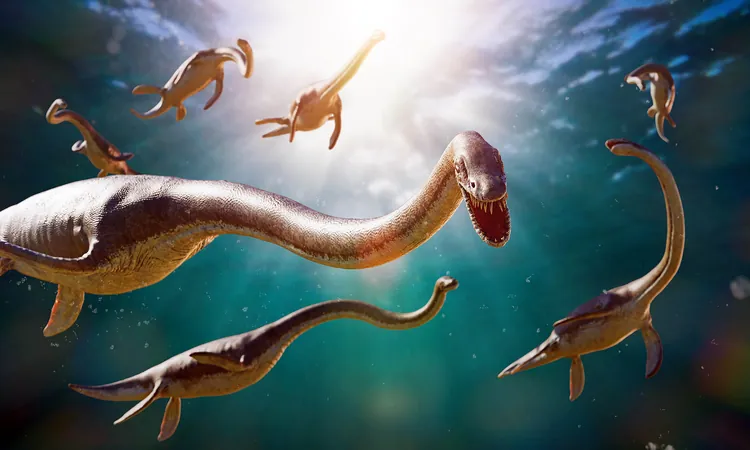
Ancient Marine Reptiles: The Apex Predators That Could Snack on Killer Whales
2025-01-16
Author: Wei
Scientists have unveiled astounding evidence suggesting that formidable marine reptiles once roamed the prehistoric oceans of what is today central Colombia. These ancient titans were not just larger than any modern creature; they were apex predators that likely considered killer whales mere snacks in their vast and complex food web.
Unearthing an Unexpected Food Chain
The fossil findings indicate that ancient marine reptiles occupied a pivotal role within the seventh trophic level of a reconstructed Cretaceous food web—a striking contrast to contemporary ecosystems where killer whales and great white sharks dominate only the sixth level. This jaw-dropping revelation challenges previous understandings of marine food chains and provokes questions regarding the evolutionary history of oceanic life.
Cortés stated, “Our study is groundbreaking as it explores these potential ecological interactions, highlighting a food chain complexity that extends well beyond the limits observed today.”
Feasting in the Warm Seas of the Early Cretaceous
During the Early Cretaceous, approximately 130 million years ago, the warm, nutrient-rich waters of the area facilitated an explosion of marine diversity. Researchers correlated fossil data from the Paja Formation with modern ecological structures, allowing them to piece together a detailed picture of these ancient ecosystems. The results revealed predators equipped with robust jaws and agile bodies, dominating the marine landscape alongside a variety of thriving invertebrates.
Fascinatingly, this period was characterized by intense competition for resources, leading to what paleontologists term the 'Mesozoic Marine Revolution.' This evolutionary arms race not only sculpted the diets and behaviors of marine creatures but also transformed them into unprecedented hunting machines.
Linking Past Ecosystems with Modern Lessons
Understanding the dynamics of these ancient marine ecosystems offers invaluable insights into how contemporary ocean environments develop and evolve following disturbances such as climate change and habitat loss. Just as modern marine systems are shaped by predator-prey interactions, the ancient ecosystems were influenced by intense competition among apex predators and their prey.
Cortés and Larsson’s research also reinforces the idea that high trophic levels can foster biodiversity, as apex predators redefine their environments, promoting a richer variety of marine life below them.
Revealing the Evolutionary Legacy
Although these mighty marine reptiles vanished toward the close of the Mesozoic era, their legacy is imprinted in the fossil record, hinting at the ecological complexities that existed long before human influence. Each fossil, from massive jaws to specialized teeth, narrates a story of adaptability and survival in an ever-changing environment.
Future research aims to expand these findings by exploring other fossil sites globally. The potential exists for discovering additional marine habitats where similar apex predators may have thrived, challenging our perceptions of biodiversity through time.
As we delve deeper into Earth's evolutionary past, it becomes clear that the oceans once housed creatures more fearsome than anything we have today. With every fossil uncovered, we gain a larger understanding of how the seas transformed, paving the way for the rich marine biodiversity we witness now.
Stay tuned for more groundbreaking revelations about ancient ecosystems and their relevance to our current world.






 Brasil (PT)
Brasil (PT)
 Canada (EN)
Canada (EN)
 Chile (ES)
Chile (ES)
 Česko (CS)
Česko (CS)
 대한민국 (KO)
대한민국 (KO)
 España (ES)
España (ES)
 France (FR)
France (FR)
 Hong Kong (EN)
Hong Kong (EN)
 Italia (IT)
Italia (IT)
 日本 (JA)
日本 (JA)
 Magyarország (HU)
Magyarország (HU)
 Norge (NO)
Norge (NO)
 Polska (PL)
Polska (PL)
 Schweiz (DE)
Schweiz (DE)
 Singapore (EN)
Singapore (EN)
 Sverige (SV)
Sverige (SV)
 Suomi (FI)
Suomi (FI)
 Türkiye (TR)
Türkiye (TR)
 الإمارات العربية المتحدة (AR)
الإمارات العربية المتحدة (AR)